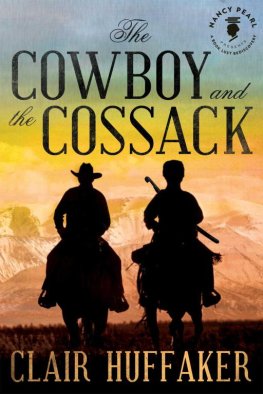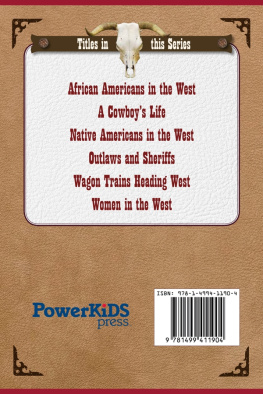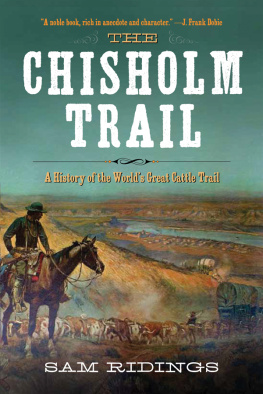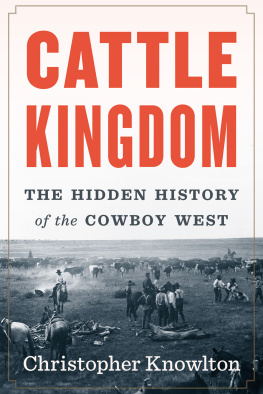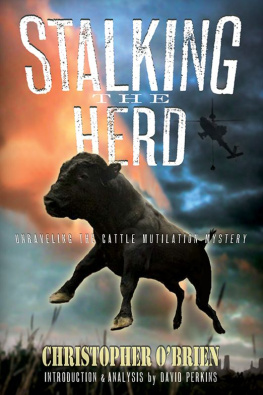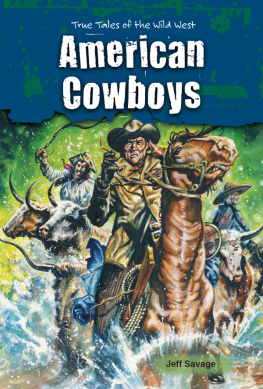Clair Huffaker
THE COWBOY AND THE COSSACK
FOR SAMANTHA CLAIR, WHO IS A COSSACK IN LOS ANGELES. FOR IVAN IGOROVITCH, WHO IS A COWBOY IN LENINGRAD. AND FOR A LADY NAMED BIG RED, WHO IS EVERYTHING, EVERYWHERE.
Oh, East is East, and West is West, and never the twain shall meet,
Till Earth and Sky stand presently at Gods great Judgment Seat;
But there is neither East nor West, border, nor breed, nor birth,
When two strong men stand face to face, though they come from the ends of the earth!
Rudyard Kipling, The Ballad of East and West, 1889

I AM perhaps the only person I know who chooses the novels she reads based on whether or not the author has chosen to start the book in question with an epigraph. I am inordinately (perhaps ridiculously) fond of these short quotations at the beginnings of novels that somehow suggest the theme of what follows. My response to a book with a well-chosen epigraph reminds me of the immortal line spoken by Rene Zellwegers character to Tom Cruises character in the movie Jerry Maguire: You had me at hello.
Of course, I cant tell if a book has an epigraph or not unless I open it up, so Im initially dependent on all the usual clues: the catchiness of the title, what I already know about the author, reviews Ive read, recommendations from friends. But when it comes right down to it, for me at least, a good epigraph can make all the difference.
I dont remember where, or even exactly when, I first came across Clair Huffakers novel The Cowboy and the Cossack. I seem to remember taking the book off a shelf in the fiction section of a library, so if I read it shortly after it was published in 1973, it would have almost certainly have been the public library in Stillwater, Oklahoma, but it somehow doesnt seem to quite jibe with what I recall of the physical layout of that particular library. (Im writing this introduction on an uncharacteristically hot August day in Seattle, so evocative of the years I spent in Oklahoma, and I pause here for an online look at the catalogs of the three public libraries where I might first have found Huffakers novelStillwaters, Tulsas, and Seattlesand find that none currently own copies of it. [Not unnaturally, this reinforces my decision to include it in the Book Lust Rediscoveries series.] Its not altogether surprising that they no longer own itif they ever did. Most likely it would have been discarded [weeded, in library lingo] long ago.)
I do remember that it was the evocative titleThe Cowboy and the Cossackthat initially led me to take the book off the shelf. I opened it and found the epigraph, an excerpt from one of Rudyard Kiplings poems. Now it just happened to be the case that I was (and am) a big fan of Kiplings novels and poetry (despite not particularly approving of his imperialist tendencies). To find that Huffaker had chosen the opening lines of The Ballad of East and West for his epigraph made The Cowboy and the Cossack irresistible to me. And Huffaker was absolutely right in his choice, as these lines perfectly sum up the plot and ethos of The Cowboy and the Cossack:
Oh, East is East, and West is West, and never the twain shall meet,
Till Earth and Sky stand presently at Gods great Judgment Seat;
But there is neither East nor West, border, nor breed, nor birth,
When two strong men stand face to face, though they come from the ends of the earth!
I chose The Cowboy and the Cossack as the fifth Book Lust Rediscovery despite or (I have to consider this) because ofcontrarian librarian that I ama pertinent fact about reading tastes, which is that, with very few (notable) exceptions, western novels dont generally rouse people to a high pitch of pre-reading excitement.
I always begin the first class session of Genre Reading for Adults, a course I teach at the Information School at the University of Washington, by asking the students to describe their experiences with genre reading. The majority of the students, all of whom are studying to get a masters degree in library and information science, range in age from twenty-five to forty, with one or two outliers on either side. Over the six or seven years that Ive taught this class, a consistent pattern has emerged. One or two people will rave about George R. R. Martins Song of Ice and Fire series. This brings many nods of appreciation and an occasional dissent on the grounds that theres way too much violence and sex. Someone will offer the opinion that Martin kills off the best characters without regard for the sensibility of his readers. Someone else will shush him, warning that thats too much of a spoiler for people who havent yet read the novels.
Someone will bring up H. P. Lovecraft, a name that brings blank looks to many class members, who have never heard of him. Another studentalmost always a womanwill describe how much she loves Janet Evanovichs Stephanie Plum series. The classicist in the cohort (there is always at least one) will bring up Dashiell Hammett and Raymond Chandler.
Occasionally students will mention how their mothers (or grandmothers) introduced them to the Agatha Christie novels. Somebody will bring up Sherlock Holmes, and in the last few years, this has always lead to a detour (which I keep brief) where we ooh and ah over (and once in a while boo) Robert Downey Jr. and Benedict Cumberbatch, each of whom has played Sherlock, in film and on television, respectively.
Someone elsealways a woman, this timewill say, with some defensiveness or embarrassment, that she reads romances only. Shell mention authors like Jayne Ann Krentz, Julia Quinn, Susan Elizabeth Phillips, Stephanie Laurens, and Suzanne Brockmann. One or two students (mostly, if not exclusively, women) will enthusiastically agree. Partly to defuse her embarrassment or her defensiveness, but mostly because its true, I will toss in at this point that I am a huge fan of Georgette Heyer. Sighs of appreciation will ripple through the class (again, mostly excluding the few males, who are generally unfamiliar with her books).
No one ever, ever mentions westerns. Not Louis LAmour, Zane Grey, or eventhis shocks me just a littleLarry McMurtrys Lonesome Dove. Or Jack Schaefers Shane. Its as if the western portion of the genre map, once at least moderately prominent, has regressed to being undiscovered territory for my students.
Many libraries pull out the genre novels from the rest of their fiction collections, so that fans of the various genres can more easily find what theyre looking for. Or, to use the vernacular of computer speak, these readers dont have to be distracted by items that dont fit their search criteria. Ive never been fond of this approach to shelving fiction, because I believe that it ghettoizes the genres. It implies that some fiction is Literature, and some fiction is Other (really, less) than Literature. Which is, in fact, what members of the literati, including many librarians, believe. Its right there in the way we designate the nongenre novels and short stories as literary fiction.
When I started working as a librarian, westerns were exclusively the purview of old men (at least they seemed old to me at the time), who could be seen checking the shelves for the latest Max Brand or the newest in the Longarm series by Tabor Evans. The hardback westerns, in their uniform dark (and increasingly dirty as the checkouts continued) cream binding were slightly smaller than non-westerns and singularly unattractive, while the paperbacks (frequently only very reluctantly purchased by a disapproving librarian) had covers featuring rifles, cattle, sometimes a beautiful, half-dressed wench, and occasionally an Indian with a tomahawk or a scalp dangling from his hand. In all my years working in libraries and bookstores, I nevernever, hand over my heartsaw a woman browsing those books.

